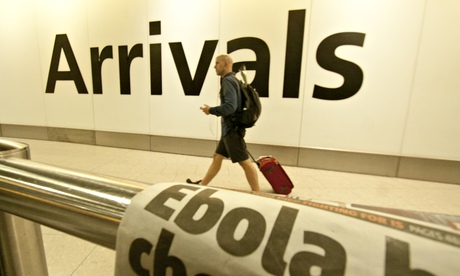
Passengers arriving from countries affected by Ebola will have their temperatures taken at UK borders starting at Heathrow on Tuesday, Jeremy Hunt, the health secretary, has said.
Hunt said it would not be possible to identify all travellers from Liberia, Sierra Leone and Guinea, but an estimated 89% would be subject to screening. Hunt said he hoped travellers from those countries would “self-present” to the authorities so that would be easier to help them if they do go on to develop Ebola.
The measures will start at Heathrow terminal 1, where most travellers from those countries should land, but it will be extended to Gatwick and the Eurostar terminals by the end of next week. There are no direct flights from affected west African countries but there are indirect routes via mainland Europe.
Hunt’s statement comes after the government initially said there was no need for screening and then resisted the idea of temperature tests.
However, he told the House of Commons on Monday that a temperature test will now be included, on top of a medical risk questionnaire.
“Passengers will have their temperature taken and complete a questionnaire asking about their current health, recent travel history and whether they might be at potential risk through contact with Ebola patients,” Hunt told MPs.
“They will also be required to provide contact details. If neither the questionnaire nor the temperature reading raises any concerns, passengers will be told how to make contact with the NHS should they develop Ebola symptoms within the 21-day incubation period, and allowed to continue on their journey. It is important to stress that a person with Ebola is only infectious if they are displaying symptoms.
“Any passenger who reports recent exposure to people who may have Ebola, or symptoms, or who has a raised temperature will undergo a clinical assessment and, if necessary, will be transferred to hospital.
“Passengers identified as having any level of increased risk of Ebola, but without any symptoms, will be given a Public Health England contact number to call should they develop any symptoms consistent with Ebola within the 21-day incubation period.”
The health secretary said the risk to the public remains low but he expects a handful of cases to occur in the UK over the next three months, as the virus continues to spread.
Andy Burnham, the shadow health secretary, welcomed the preparations but criticised the government for its “confusion” last week over whether there would be screening at the UK border.
Hunt said the government changed its position after the advice from Dame Sally Davies, the UK chief medical officer, changed last week.
Over the weekend, Boris Johnson, the mayor of London, warned there is little doubt a case of Ebola will come to the UK and this will most probably be in London.
The London mayor also admitted that health checks at UK airports were a “far from perfect solution” and cautioned the government against seeming to “promise stuff that doesn’t really make any sense”.
The UK has increased its preparations for potential cases of Ebola after a Spanish nurse became the first person to contract the illness on European soil while caring for two repatriated missionaries who had been working in west Africa.
However, the screening has come in for criticism from some quarters, as incoming passengers may not yet display symptoms of Ebola when they are being tested.
